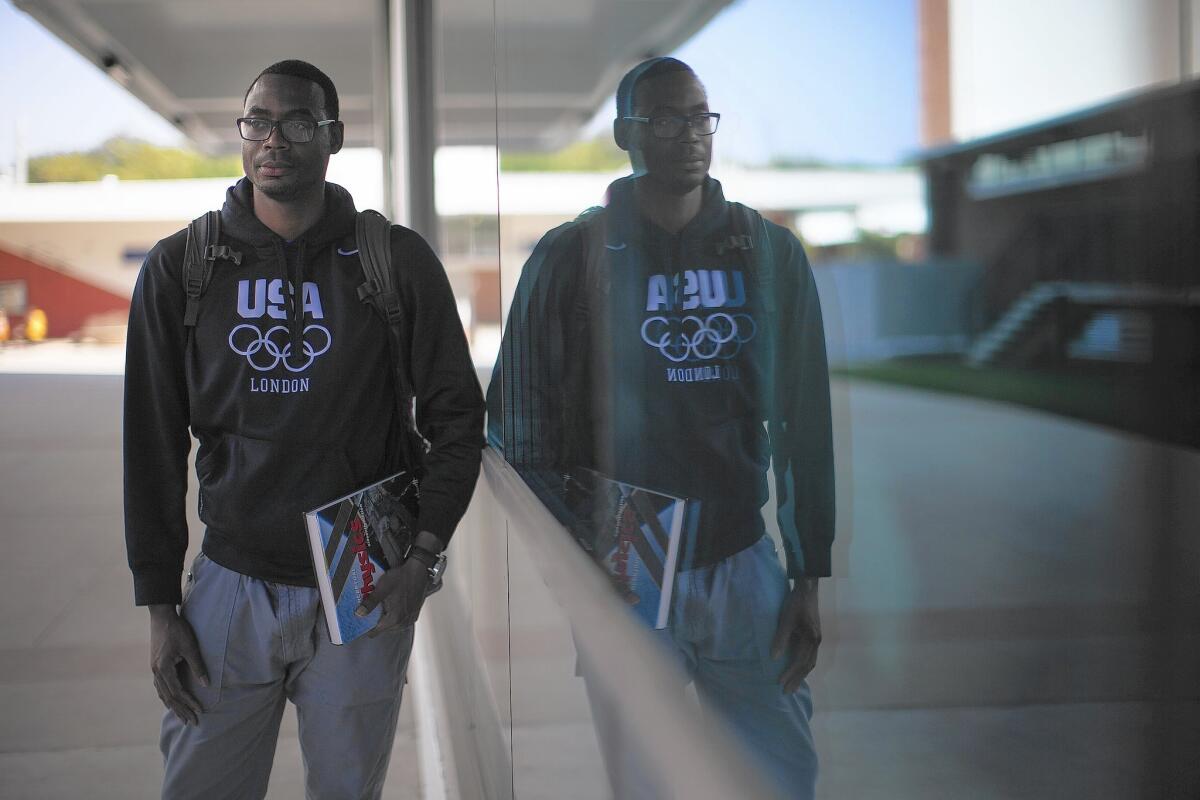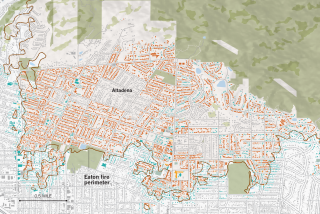Air Force veteran with tech skills stuck with $10 an hour at department store

- Share via
In the haves and have-nots economy of Southern California, Air Force veteran Rod McIntosh is currently embedded with the nots.
The 36-year-old can’t find a tech job despite years of military training and employment in that field, so he’s had to temporarily settle for a $10-an-hour post in men’s clothing at Bloomingdale’s.
He has no car, and digging out of a rut is all the harder when you travel by bus. For a while, he slept on a cousin’s couch. These days, he’s renting space in a house in South Los Angeles.
In other words, McIntosh lives like multitudes do here in the stratified kingdom of hillside castles and cardboard cities. So he’s got plenty of perfectly good reasons to be discouraged.
But he isn’t.
Frustrated, yes. Discouraged, no.
“One thing I’ve been told is that I am very persistent,” said McIntosh.
Yes, that’s one thing that seems to have impressed people I spoke to about McIntosh. Another is how focused and determined he is.
And then there’s his bold plan to reverse his fortunes.
But before I tell you about it, let’s go back to 1997, when McIntosh graduated from high school in North Carolina and enlisted, figuring he’d learn a trade and carry it back to civilian life. The Air Force trained him in information technology and satellite communications, and when McIntosh was discharged after nine years, he had no trouble landing defense contract work in the U.S. and later Europe, where he had served.
But there was one big bump on his way to having it made. McIntosh got married while in the Air Force, had a son, and then the marriage fell apart, with his wife and son anchoring in Sacramento. Last May, when a defense contract ended in Europe, McIntosh moved to Los Angeles. He reasoned that he’d be better able to keep up his support payments by fishing in the vast L.A. job market and heading north on weekends for some family time.
For a brief moment, it looked like a smart plan. McIntosh got a couple of bites and thought he’d landed a tech job, but his heart was broken at the finish line when the company went with someone else.
After that, he stockpiled a stack of rejections. It’s not as if there are no jobs in his field, McIntosh said. But the competition is stiff for every one of them, and although he may be qualified experience-wise, he began thinking he lacked one essential thing: a college degree.
“I’m just not getting the callbacks,” he said. “I guess I don’t have what they’re looking for.”
He’s not alone in that regard, and he happens to be in two demographic groups with staggeringly high rates of unemployment and under-employment: He’s a veteran, and he’s African American.
A USC study found that nearly 25% of the L.A. region’s veterans have annual incomes at or below poverty level. And Sherri Bell, of the Los Angeles Black Worker Center, said 50% of L.A.’s African American adults are either unemployed or make $12 an hour or less.
McIntosh linked with Bell’s group (he met her at a job fair) and the local Raise the Wage coalition, attending rallies to speak up for the L.A. City Hall plan to raise the minimum wage. About 800,000 workers in L.A. County earn minimum wage, meaning they make about $20,000 a year in a region where that puts you a half-inch from homelessness.
To McIntosh, news of record profits for some companies at a time of gross income inequality suggests the system is rigged. And SoCal Edison crossed a line, in his opinion, in recently announcing it would lay off 400 IT workers (his very field) and replace them with cheaper labor in India.
“To me,” said McIntosh, “that’s not ethical.”
But he’s not going to wait patiently for fair play and economic justice to gain a stronger foothold in the American workplace. He’s decided he needs to be more aggressive, and smarter, about elbowing his way back into the middle class, and he has made a college degree his first priority.
“Sir I start class at 1400,” he texted me on the day I met up with him at El Camino College, where he’s a freshman with a full load of classes.
McIntosh is taking advantage of the GI Bill, going to school two days a week, going to work three days a week, and studying every day. He found temporary help with transportation and housing costs through a veterans assistance program administered by PATH, or People Assisting the Homeless.
“I have no doubt that he will be successful,” said PATH’s Luz Angelica Vazquez, who steered McIntosh to Bloomingdale’s in Century City because the store seeks out veterans and offers flexible hours, allowing McIntosh to concentrate on school.
And El Camino is just a start, as McIntosh sees it. Last fall, he went to a veterans job fair at Dodger Stadium and was drawn to the bright orange Caltech booth, which was manned by job recruiter Stephanie Hancock.
“He came right over and said he wanted to go to Caltech,” said Hancock. “I did clarify that I was recruiting for staff positions, and he said he’d be really happy to work at Caltech because he really, really wanted to go to Caltech.”
Which is, of course, one of the most competitive schools in the universe.
So what did Hancock tell him?
“I said, ‘If that’s what you’d like to do, then great.’ I’m not going to discourage anyone who wants to further their education.”
McIntosh told me he’s dead serious about Caltech.
“I’d want to transfer as soon as possible,” he said.
I’m with Hancock; far be it from me to tell him the odds are a little intimidating. McIntosh does recognize the possibility that Caltech might not work out, so he’s already looking into two backup options, neither of which is too shabby.
USC and UCLA.
“I’ve been making my face known,” McIntosh told me, saying he had visited USC five or six times on reconnaissance missions. “I go into the office of admissions and I’ve been to the school of engineering to ask questions about what path I should take” and what courses to complete at El Camino College.
Getting to school and back home, by the way, is a four-bus ordeal. Same with work, and McIntosh leaves the house at 7 a.m. to make sure he’s not late for his 9 a.m. start.
McIntosh started in housewares at Bloomingdale’s but moved to men’s clothing, where he now gets a commission if he exceeds a weekly sales target. If not, he gets $10 an hour, which is the way it usually works out. That means he can’t shop in the store he works at; he got his only suit at Hollywood Suit Outlet.
But he said he likes the challenges of the job — you’ve got to know the merchandise, polish your schmoozing skills and develop a stable of regular customers who seek you out.
I asked if it can be discouraging to sell things he can’t afford to well-heeled customers from Beverly Hills and environs.
Not really, McIntosh said.
“That’s what keeps Caltech as my No. 1 goal.”
More to Read
Sign up for Essential California
The most important California stories and recommendations in your inbox every morning.
You may occasionally receive promotional content from the Los Angeles Times.











